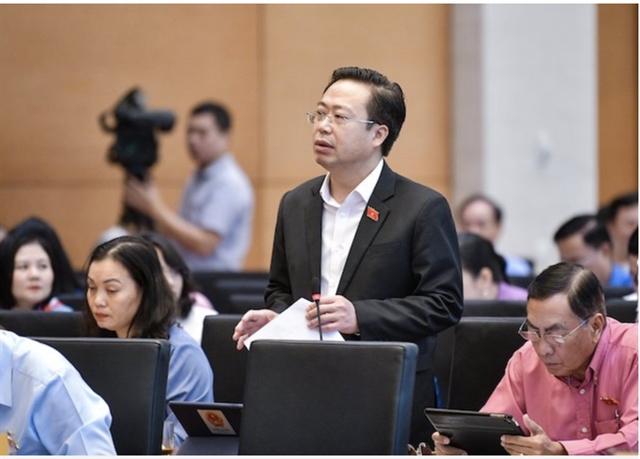 Society
Society

 |
| Members of the National Assembly Standing Committee attend its 34th session in Hà Nội on Tuesday morning.—VNA/VNS Photo Thống Nhất |
HÀ NỘI —The Standing Committee of the National Assembly (NA) agreed on Tuesday morning to look for a vote from deputies on imposing a zero tolerance level for drunk driving, prohibiting any alcohol consumption at all, within the draft Law on Road Traffic Order and Safety.
The NA’s Standing Committee was commenting during a debate on the major issues in the adjustment of the draft Law on Road Traffic Order and Safety, while the committee convened its 34th three-day session in Hà Nội.
The draft law is expected to be passed at the second phase of the seventh session of NA at the end of June.
On Tuesday, the chairman of the NA's Committee for National Defence and Security Lê Tấn Tới said that following discussions, there had been many in favour of the zero suggestion.
However, others had proposed setting a minimum alcohol threshold, while some suggested that the NA deputies should be able to make choices from other options of different levels of concentration levels.
Tới said that the provision inherited from the 2008 Road Traffic Law (now divided into two laws, consisting of the Law on Road Traffic Order and Safety and the Road Law), is consistent with the provisions of the 2019 Law on Prevention and Control of Harmful Effects of Alcoholic Beverages.
He said that if Việt Nam did not continue the provisions of the 2019 Law on Prevention and Control of Harmful Effects of Alcoholic Beverages, that would lead to an increase in the number of traffic accidents, leading to yet more damage to the lives, health and property of drivers and other road users, causing many social repercussions and wasting the efforts and money of the State and the people.
Therefore, the NA’s Committee for National Defence and Security proposed that the Committee consider a provision to ban any driver who caused a road traffic accident and was found to have any trace of alcohol in their blood or breath.
Conducting the session, vice chairman of the NA Trần Quang Phương said "Following our culture, banning will contribute to better traffic safety.”
Vice chairman of the NA Nguyễn Khắc Định said that the ban had proven effective in practice and was currently being applauded by the Government, the NA’s Standing Committee and many NA deputies.
However, he also noted that there were still different views.
He said that while nine NA deputies agreed to an absolute zero level of alcohol concentration, three deputies instead favoured setting an alcohol threshold, rather than a total ban.
Warning devices on school buses
Also at the session on Tuesday, Tới proposed the NA’s Standing Committee supplement regulations on school buses so that recording devices were mandatory, to take images of children being ferried to school in order to avoid any being left on the vehicles.
Expressing support for the proposal, vice chairman of the NA Nguyễn Khắc Định said the reviewing agencies, drafting agencies and the National Assembly were clearly concerned over the safety issue of children being inadvertently left on vehicles.
He also added that it was necessary to thoroughly review school buses and remove those that did not meet desired standards.
Echoing this view, Secretary-General of the NA, Head of the NA Office Bùi Văn Cường said that the supplementation in the draft law contributed to specific and stringent regulations for vehicles picking up and dropping off students.
In his opening remarks at the 34th session of the NA's Standing Committee, NA Chairman Trần Thanh Mẫn said during the three-day meeting, full-time legislators would study eight draft laws and three draft resolutions, to be submitted and approved at the second phase of the NA’s seventh meeting from June 17-27.
The draft laws are the amended Social Insurance Law; the Law on National Defence, Security Industries and Industrial Mobilisation; the Road Law; the Law on Road Traffic Order and Safety; the revised Capital Law; the amended Law on the Organisation of the People's Courts; the revised Law on the Management and Use of Weapons, Explosives and Supporting Tools; and the law amending and supplementing some articles of the Law on Security Guard Force.— VNS